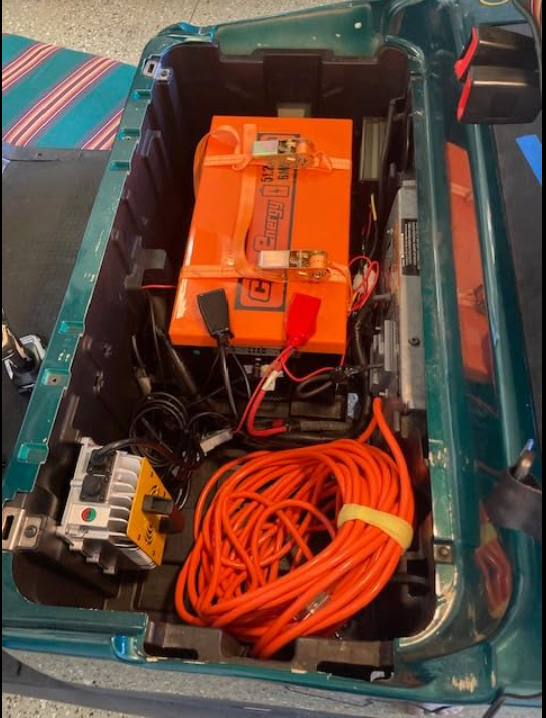Golf Cart Lithium Battery Replacement for 2013 Club Car Precedent
The Complete Guide to Upgrading Your 2013 Club Car Precedent with a CloudEnergy Golf Cart Lithium Battery
As golf carts age, the need for battery replacement becomes inevitable. In recent years, there has been a growing trend towards upgrading to lithium batteries due to their efficiency and longevity. CloudEnergy offers a superior solution for your 2013 Club Car Precedent. In this guide, we will explore the benefits of lithium batteries and share a real-life application from our customer, Sailor Rick.
Overview of the 2013 Club Car Precedent
The 2013 Club Car Precedent is a popular model known for its durability and performance. However, like all golf carts, it faces common battery issues over time. Traditional lead-acid batteries tend to wear out, requiring frequent replacements and maintenance. Lithium batteries, on the other hand, offer numerous advantages such as reduced weight, minimal maintenance, and improved charge efficiency, making them the preferred replacement option.
Customer Case Study: Sailor Rick’s Experience
Meet Sailor Rick, a proud owner of a 2013 Club Car Precedent. When it was time to replace his golf cart battery, he chose CloudEnergy lithium batteries. Here’s a detailed walkthrough of his installation process and the benefits he has experienced since:
CloudEnergy 48V 100Ah High Performance Li-ion Golf Cart Battery
Installation Process
Rick followed these steps to upgrade his battery:
- Switch to tow mode and turn off the key.
- Remove old batteries.
- Using a dremel or multi-tool, remove the plastic divider at the bottom of the battery compartment to ensure adequate width for the new battery.
- Remove screws from the top of the plastic molding and side plates to access the battery compartment.
- Pull up on the plastic molding to remove the kick plate and charger plug.
- Install the new negative terminal cable and run it through the metal plate.
- Install a 48 to 12-volt converter for 12-volt accessories.
- Run the battery LCD wire through the plastic molding and mount the LCD indicator.
- Install the hold-down ratchet straps and secure the battery in place.
- Mount the battery charger on the forward wall and install the port charger plug.
- Connect the negative and positive cables to the battery, ensuring all connections are secure.
- Clean up wire runs and secure with zip-ties.
Benefits Experienced
Since installing the CloudEnergy lithium battery, Rick has noticed significant improvements in his golf cart's performance, including:
- Longer driving range on a single charge
- Improved acceleration and power
- Reduced weight and maintenance needs
- Increased reliability and longevity

Step-by-Step Guide for Lithium Battery Replacement
Here’s a detailed guide to help you replace your golf cart battery with a CloudEnergy lithium battery:
Tools and Materials Needed
- 48 to 12-volt converter with key wire
- 20 amp port charger plug
- 24 inch negative 4 AWG battery cable
- About 12 feet of 16 AWG wire
- Battery terminal insulating covers
- 20 amp extension cord
- Battery strap to remove old batteries
- 8 stainless self-tapping screws
- Various electrical connection pieces and electrical tape
- Heavy-duty Velcro for mounting LCD
Installation Steps
- Remove the old lead-acid batteries from your Club Car Precedent.
- Prepare the battery compartment by removing any plastic dividers and ensuring adequate space for the new battery.
- Install the CloudEnergy lithium battery in the battery compartment.
- Connect the battery terminals securely, ensuring all connections are tight.
- Install the 48 to 12-volt converter for 12-volt accessories.
- Run the battery LCD wire through the plastic molding and mount the LCD indicator.
- Secure the battery with hold-down ratchet straps and ensure it is firmly in place.
- Mount the battery charger on the forward wall and install the port charger plug.
- Connect the negative and positive cables to the battery, ensuring all connections are secure.
- Clean up wire runs and secure with zip-ties to prevent any interference with the charger.
Benefits of Upgrading to a CloudEnergy Lithium Battery
Upgrading to a CloudEnergy lithium battery offers numerous benefits, including:
- Increased lifespan and reliability
- Better power efficiency
- Reduced weight and maintenance needs
- Environmentally friendly compared to traditional lead-acid batteries
Frequently Asked Questions
- Q: How long does it take to charge the CloudEnergy lithium battery?
- A: Charging time depends on the charger used, but typically it takes about 5-6 hours for a full charge.
- Q: Can I install the battery myself?
- A: Yes, with the right tools and following our step-by-step guide, you can install the battery yourself. However, professional installation is recommended for optimal performance.
- Q: What are the maintenance requirements for lithium batteries?
- A: Lithium batteries require minimal maintenance compared to lead-acid batteries. Regularly check connections and ensure the battery is clean and dry.
- Q: How long do CloudEnergy lithium batteries last?
- A: CloudEnergy lithium batteries are designed to last up to 10 years with proper care and usage.
Conclusion
Upgrading your 2013 Club Car Precedent with a CloudEnergy lithium battery is a smart investment that offers numerous benefits. From increased lifespan and efficiency to reduced maintenance needs, lithium batteries are the superior choice for your golf cart. Consider the long-term benefits and sustainability of your investment, and make the switch to CloudEnergy today.
Upgrade Your Golf Cart Today!
Ready to experience the benefits of CloudEnergy lithium batteries? Explore our range of high-performance batteries and upgrade your golf cart today. For personalized recommendations or more information, contact our sales team or visit our product page.
Leave a Reply
- Golf Cart Lithium Battery Replacement for 2013 Club Car Precedent
- Upgrade Your Club Car DS with CloudEnergy Lithium Batteries
- Understanding LiFePO4 Charge Curves: A Comprehensive Guide
- Upgrading Your Golf Cart to Lithium Batteries: A Comprehensive Guide
- What Are the Best Battery Types for Off-Grid Living?